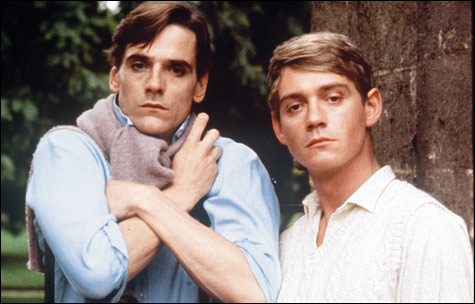The novel and the Granada TV adaptation
By JEFFREY GANTZ | July 23, 2008

THE WAY IT WAS: Jeremy Irons, Anthony Andrews, and Aloysius starred in Granada’s revered 1981 Brideshead Revisited. |
Written in 1944, when its author was a junior officer languishing in England, Brideshead Revisited is “Evelyn Waugh Revisited.” Waugh had made his name with a series of concertina-wire novels: Decline and Fall, Vile Bodies, Black Mischief, A Handful of Dust, Scoop, Put Out More Flags. Brideshead Revisited is of a different stripe: subtitled The Sacred & Profane Memories of Captain Charles Ryder, it’s a meditation on Waugh’s own conversion to Catholicism, in 1930. It’s set in 1943, when Charles Ryder is the captain of a company that’s being shunted about Great Britain and winds up billeted at Brideshead, whereupon Charles remembers how he fell in love with Sebastian Flyte. The book has elements of what Frank Kermode calls “transfigured biography”: at Oxford Waugh himself majored in drinking and homosexual friends; like Charles, he made a living as an artist; like Rex Mottram, he was divorced and, according to the Church, ineligible to marry again.It’s not a novel of easy answers. In Venice, Lord Marchmain’s mistress, Cara, tells Charles that Lady Marchmain “is a good and simple woman who has been loved in the wrong way,” that Lord Marchmain “is hating all the illusions of boyhood — innocence, God, hope,” and that Sebastian “is in love with his own childhood.” Cara speaks with the bittersweet wisdom of the Continental Woman, but does she speak for Waugh? Others would have it that Lady Marchmain drove her husband to drink and to Europe with her piety. And when at the end Julia tells Charles, “It may be a private bargain between me and God, that if I give up this one thing I want so much [Charles], however bad I am, he won’t quite despair of me in the end,” does Waugh expect us to endorse her nursery-room school of Christianity? What is clear is that the Flytes are neither nicer nor better than anyone else, and that at the end what descends on Captain Ryder when he revisits the Brideshead chapel and finds the small red flame burning in the beaten-copper lamp of deplorable design is not happiness but grace.

Brideshead Revisited has been adapted once before: Granada did it for British television in a series that ran 11 hours, an extraordinarily generous length for a 315-page novel. There’s hardly a line in the Granada version that’s not in the book. (At a guess, less than half of the screenplay of the new Miramax film comes from Waugh.) Directed by Michael Lindsay-Hogg and then Charles Sturridge (there was a strike, and when shooting resumed Lindsay-Hogg was promised to another project), the series ran in Great Britain in 1981, and then as part of PBS’s Great Performances early in 1982, with Geoffrey Burgon’s oboe-horn-and-trumpet-haunted score, and William F. Buckley hosting brief post-episode theology discussions (!) with Hugh Kenner and Wilfrid Sheed, and a cast that included Jeremy Irons as Charles, Anthony Andrews as Sebastian (the original idea was the other way around), Diana Quick as Julia, Claire Bloom as Lady Marchmain, Laurence Olivier as Lord Marchmain, Stéphane Audran as Cara, and John Gielgud as Charles’s demonically dotty father. In many cases — notably Charles Keating’s Rex and Jane Asher’s Celia — the characterization has a fullness and complexity that Waugh’s novel and the new film only hint at, and when Andrews puts his arm through Irons’s, love trumps sex. It’s now available in a “25th Anniversary Collector’s Edition” four-DVD set from Acorn Media, with a 50-minute documentary about the making of the series and a set of outtakes marked by Andrews’s proclivity for whipping out a bottle of Champagne in the middle of any take and dousing his hapless co-stars.
 Related
Related:
 Topics
Topics:
Features
, Jeremy Irons
, Charles Ryder
, Evelyn Waugh
, More  , Jeremy Irons
, Charles Ryder
, Evelyn Waugh
, Movies
, Entertainment
, Movie Reviews
, John Gielgud
, Sebastian Flyte
, Rex Mottram
, William F. Buckley, Jr.
, Less
, Jeremy Irons
, Charles Ryder
, Evelyn Waugh
, Movies
, Entertainment
, Movie Reviews
, John Gielgud
, Sebastian Flyte
, Rex Mottram
, William F. Buckley, Jr.
, Less 